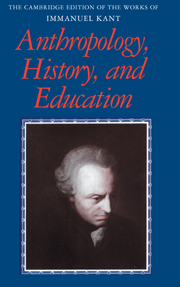Book contents
- Frontmatter
- Contents
- General editors' preface
- Preface
- General introduction
- 1 Observations on the feeling of the beautiful and sublime (1764)
- 2 Essay on the maladies of the head (1764)
- 3 Review of Moscati's work Of the corporeal essential differences between the structure of animals and humans (1771)
- 4 Of the different races of human beings (1775)
- 5 Essays regarding the Philanthropinum (1776/1777)
- 6 A note to physicians (1782)
- 7 Idea for a universal history with a cosmopolitan aim (1784)
- 8 Review of J. G. Herder's Ideas for the philosophy of the history of humanity. Parts 1 and 2 (1785)
- 9 Determination of the concept of a human race (1785)
- 10 Conjectural beginning of human history (1786)
- 11 Some remarks on Ludwig Heinrich Jakob's Examination of Mendelssohn's Morning hours (1786)
- 12 On the philosophers' medicine of the body (1786)
- 13 On the use of teleological principles in philosophy (1788)
- 14 From Soemmerring's On the organ of the soul (1796)
- 15 Anthropology from a pragmatic point of view (1798)
- 16 Postscript to Christian Gottlieb Mielcke's Lithuanian–German and German–Lithuanian dictionary (1800)
- 17 Lectures on pedagogy (1803)
- Editorial notes
- Glossary
- Bibliography
- Index
5 - Essays regarding the Philanthropinum (1776/1777)
Published online by Cambridge University Press: 05 May 2013
- Frontmatter
- Contents
- General editors' preface
- Preface
- General introduction
- 1 Observations on the feeling of the beautiful and sublime (1764)
- 2 Essay on the maladies of the head (1764)
- 3 Review of Moscati's work Of the corporeal essential differences between the structure of animals and humans (1771)
- 4 Of the different races of human beings (1775)
- 5 Essays regarding the Philanthropinum (1776/1777)
- 6 A note to physicians (1782)
- 7 Idea for a universal history with a cosmopolitan aim (1784)
- 8 Review of J. G. Herder's Ideas for the philosophy of the history of humanity. Parts 1 and 2 (1785)
- 9 Determination of the concept of a human race (1785)
- 10 Conjectural beginning of human history (1786)
- 11 Some remarks on Ludwig Heinrich Jakob's Examination of Mendelssohn's Morning hours (1786)
- 12 On the philosophers' medicine of the body (1786)
- 13 On the use of teleological principles in philosophy (1788)
- 14 From Soemmerring's On the organ of the soul (1796)
- 15 Anthropology from a pragmatic point of view (1798)
- 16 Postscript to Christian Gottlieb Mielcke's Lithuanian–German and German–Lithuanian dictionary (1800)
- 17 Lectures on pedagogy (1803)
- Editorial notes
- Glossary
- Bibliography
- Index
Summary
TRANSLATOR'S INTRODUCTION
Each of the following short pieces appeared originally in the Königsbergische gelehrte und politische Zeitung, and each also strongly reflects Kant's intense admiration for the Philanthropinum institutes of education that were first established by Johann Bernhard Basedow (1724–90). At the end of the Friedländer lectures on anthropology, Kant summarizes his hopes for these institutes as follows:
The present Basedowian institutes are the first that have come about according to the perfect plan of education. This is the greatest phenomenon which has appeared in this century for the improvement of the perfection of humanity, through it all schools in the world will receive another form, and the human race will thereby be freed from the constraints of the prevailing schools.
(25: 722–3; see also Moralphilosophie Collins, 27: 471)Building on Rousseau's appeal for educational methods that would work with rather than against nature, the Philanthropinum institutes introduced a variety of pedagogical techniques and priorities that have since earned a place in the educational mainstream – e.g., conversation-based approaches to foreign language teaching (including Latin), gymnastics and physical education, and less stress on memorization. But above all, it was the non-sectarian and cosmopolitan emphases of Basedow's curriculum that appealed to Kant.
- Type
- Chapter
- Information
- Anthropology, History, and Education , pp. 98 - 104Publisher: Cambridge University PressPrint publication year: 2007
- 2
- Cited by

